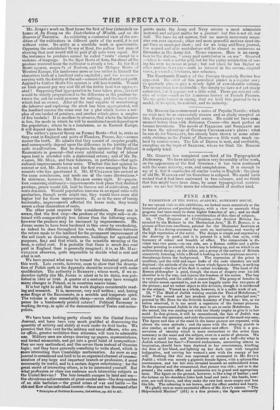Mr. Jovs's work on Rent forms the first of four
(intended) vo- lumes of, An Essay on the Distribution of Wealth, and on the Sources of Taxation. As exhibiting a connected view of the con- dition of the cultivators in different parts of the world, it is not without value. Its utility as a scientific work is questionable. Opposing the established theory of Rent, the author first aims at showing that rent would still be paid if all soils were equal. But the instances he produces cannot be called "rents" except by a violence of language. In the Ryot Rents of Asia, the share of the produce received from the cultivator is clearly a tax. In the Serf Rents (quwre, wages?) of Eastern, and the Metayer Rents of Western Europe, the landowner more or less unites in himself the characters both of a landlord and a capitalist ; and his revenue— varying with the fertility of the soil—consists both of rent and profit. Applied to Cottier Rents this opinion is still less tenable. Would an Irish peasant pay any rent till all the fertile land was appropri- ated? Supposing that appropriation to have taken place, his rent would be strictly proportioned to the difference in the produce be- tween the soil he could procure for nothing, and the most fertile which had an owner. After all the land capable of maintaining the labourer and replacing the stock has been appropriated, will the landlord receive the same rent for a plot which leaves a sur- plus of one bushel of potatoes, and another which gives a surplus of five bushels ? It is needless to observe, that where the labourer is free, the mode in which he will be maintained must depend upon the population ; where he is a bondsman, as in Eastern Europe, it will depend upon his master. The author's general theory on Farmer Rents—that is, rents as they exist in England and parts of Flanders, France, &c.—comes nearer the truth. He admits that they consist of surplus profits, and consequently depend upon the difference in the fertility of the soils in cultivation. But he disputes the opinion of the Political Economists in general—that every additional outlay of labour upon land is attended with a diminished return ; and of Mr. Ri- CARDO, Mr. MILL, and their followers, in particular—that agri- cultural improvements lower rents. Whether this last opinion be correct or not, Mr. JONES is not the first even amongst the Eco- nomists who has questioned it. Mr. M'CuLLocu has arrived at the same conclusions, and made use Al the same illustrations.* In strictness, however, Mr. RICARDO seems right. If—popula- tion remaining stationary—improvements took place that doubled produce, prices would fall, land be thrown out of cultivation, and rents. diminish. Should population increase in an equal ratio with production, though rents might rise, they would have risen still higher but for those improvements. If, as in the case of turnip husbandry, improvements affected the lower soils, they would cause a clear .diminution of rents.
The other point requires little consideration. Every one is aware, that the first crop—the produce of the virgin soil—is ob- tained with comparatively less labour than the following crops, however the produce may be increased by improvements. Mr. JONES seems to have been hardened in this error by overlooking, as indeed he does throughout his work, the difference between the return made to the landlord for the permanent improvement of the soil (such as draining, enclosures, buildings for agricultural purposes, &c.) and that which, in the scientific meaning of the term, is called rent. It is probable that there is much less rent paid in England than is generally imagined ; it is, as Mr. MAC- CULLOM observes, quite impossible to decide what is rent and ivhat is not.
We have praised what may be termed the historical portion of this work. Late events, however, seem to show that the descrip- tion of Polish serfs in the Appendix should be received with some qualification. The authority is BURNETT ; whose work, if we re- member rightly (for Mr. JONES is silent as to its date), was pub- lished in 1805 or 1806. A quarter of a century may have wrought many changes in Poland, as in countries nearer home.
It is but right to add, that the work displays considerable read- ing and research. It is, moreover, very well written ; and, bating some flings at the Economists, in a sensible and temperate spirit. The volume is also remarkably cheap—seven shillings and six- pence for a handsomely printed . octavo ! Political Economy is working its way, in spite of the denunciations of Tories and mono- polists.



























 Previous page
Previous page